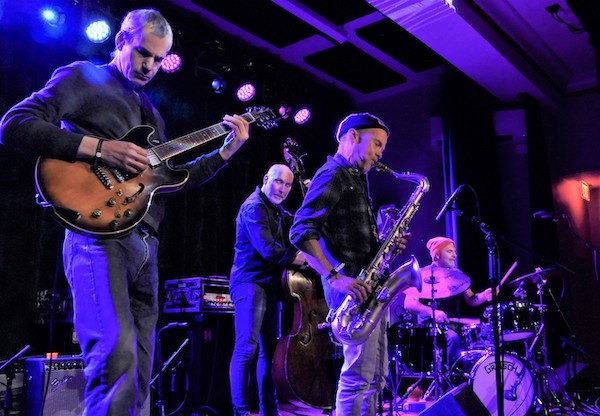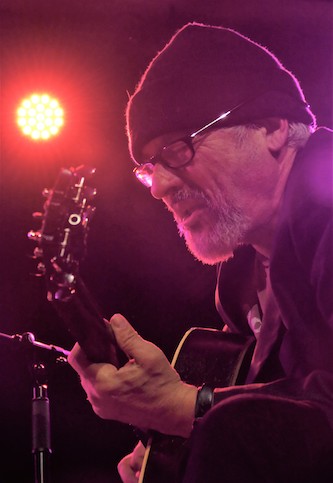Concert Review: The Bad Plus and Marc Ribot — A True Double Bill
By Paul Robicheau
Both jazz combos, The Bad Plus and Marc Ribot, sport connections to rock, which might have contributed to the sold-out room.

The Bad Plus at Somerville’s Crystal Ballroom. Photo: Paul Robicheau.
Two jazz combos showcased their guitarists at Somerville’s Crystal Ballroom on Saturday, a bit of an irony considering that one was ostensibly an organ trio and the other a group that spent its first two decades as an acoustic piano trio.
Both also sport connections to rock that may have contributed to the sold-out room. A particular attraction since he rarely performs in Boston, Marc Ribot is known for his barbed guitar on Tom Waits’ Rain Dogs and Mule Variations as well as Robert Plant and Alison Krauss’ Raising Sand, plus broad solo projects that now include organ trio the Jazz-Bins. The Bad Plus built part of its initial buzz around arch interpretations of music by Nirvana, Blondie, Aphex Twin, and Rush.
But the Bad Plus eschewed covers Saturday in its closing set, which clocked in at merely 65 minutes to balance the same for Ribot’s group as a true double bill. The focus was on recent compositions by the band’s co-founders, acoustic bassist Reid Anderson and drummer Dave King, while highlighting the subtly enveloping input of new members Chris Speed on tenor sax and Ben Monder on guitar.
The new quartet, introduced on 2022’s eponymous The Bad Plus, kept a rhythmic and tonal dance churning between the instrumentalists. In the original trio, King commanded a friskier role, mixing his active drumming with sound-effect toys. But, while a couple of those lay by his kit, he stuck to supportive synergy on drums Saturday — though he erupted in the constant off-kilter tumble of “Sick Fire.” Saxman Speed hit one typical squeal to mark that tune’s initial stanza, but mostly engaged with Monder in unison lines that snaked over the flaring rhythm. Monder (whose own rock bonafides came from playing on David Bowie’s swan song Blackstar) iced the song with tight speed-metal flurries up and down his guitar neck.
Propulsive pieces like that alternated with more melancholy ones such as “Salvages,” where Speed struck a high, pensive tone laced by Monder’s glassy chords over King’s building floor-tom patter with brushes and Reid’s rubbery bass figure. The bassist also paced the set as a deadpan emcee, describing “You Won’t See Me Before I Come Back” (which likewise swelled from ballad to swirling assault by a seat-bouncing King) as a “formative experience of going to the grocery store.”
Before set’s end, Speed switched to clarinet and Monder picked with fluttering fingertips, suggesting a palette of tones and techniques for the band’s next trip.

Marc Ribot at Somerville’s Crystal Ballroom. Photo: Paul Robicheau.
Stage personality wasn’t a priority for Ribot, who sat in a chair over his pedals and mostly kept his head down under a dark skull cap, attacking his worn hollow-body electric before he rose with a smile at set’s end to meet the crowd’s appreciation.
For a guitarist whose 30-plus year endeavors have ranged from John Zorn squonk to Cuban music and Philly soul, Ribot positions the Jazz-Bins as a nod to his organ trio roots with Jack McDuff, who gave Ribot his first touring opportunity in 1979.
Greg Lewis manned a Hammond B-3, bouncing his fingers across its rows of keys with clean, punchy notes that reflected his love of Thelonious Monk while working the instrument’s bass pedals with his stocking feet. Chad Taylor handled the drums with a firm, straightforward beat that fit the soul-jazz idiom. But while Ribot gave space to his Bin mates with hand cues, he maintained most of the attention.
The loose approach to tunes associated with guitarist Grant Green (who recorded with McDuff in the ’60s) like “Play it Funky Now” and “Sookie Sookie” played to Ribot’s wild streak as a player. Favoring his guitar’s higher strings, he brought a woolly snarl to his single-note lines with primitive vibrato, while mixing jazzy chords and nasty bursts of notes.
Near the end of the set, Ribot struck two deep, reverberating chords only to slip into a brittle, lattice-like melody like something off an old Grateful Dead record. By then, the Jazz-Bins groove had lapsed into more of the same territory, but Ribot kept things raw and fresh. Too bad he doesn’t bring more of his projects to town.
Paul Robicheau served more than 20 years as contributing editor for music at the Improper Bostonian in addition to writing and photography for the Boston Globe, Rolling Stone, and many other publications. He was also the founding arts editor of Boston Metro.
